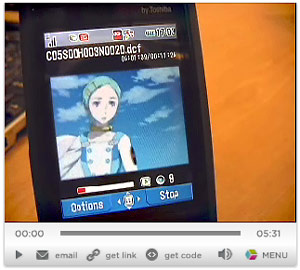DoCoMo and MTS Form Strategic i-mode Partnership
NTT DoCoMo, Inc., Japan’s leading mobile communications provider, and Mobile TeleSystems OJSC, the largest mobile phone operator in Russia and the CIS, today announced that have formed an exclusive strategic partnership under which MTS will launch i-mode in Russia and other CIS countries. As a result of this agreement, i-mode will become available through 13 operations. This long-term agreement, signed today by these two leading mobile operators, will allow MTS to offer i-mode services to its in Russia via its GSM/GPRS/EDGE networks, with DoCoMo providing its brand name, know-how and technology. MTS plans to introduce i-mode in Russia before December 2005.


 Vodafone Japan is back in Japan’s 3G data race with today’s launch of Vodafone live! BB, a fixed-line PC Web
Vodafone Japan is back in Japan’s 3G data race with today’s launch of Vodafone live! BB, a fixed-line PC Web